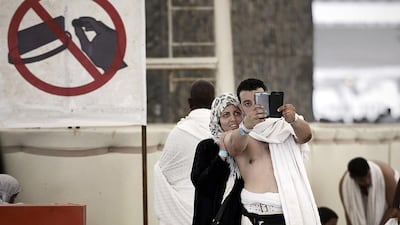MINA, Saudi Arabia // Raising his arm, Yousef Ali hugs his elderly father in front of one of Islam’s holiest sites as they grin for a craze that has hit this year’s Haj – a selfie.
But not everyone is happy about young pilgrims constantly snapping selfies, photographs taken of one’s self, as they carry out the rites of Haj.
From Tawaf – circling the holy Kaaba in Mecca – to prayers atop Mount Arafat, and stoning of the “devil” in Mina, the stages have all been recorded on cameras and smartphones for posterity, and for instant sharing through social media.
“As this is my first pilgrimage, it is important for me to document all the events taking place around me,” Mr Ali, 24, said, snapping a picture of himself with a green sign reading “Big Jamarah”, which refers to a wall where Muslims ritually stone Satan.
“Wherever I go, I take pictures, especially since nowadays we have these little cameras ... that offer a full view of the area,” the Kuwaiti said.
Mr Ali’s father Mohammed Ali, 65, said: “A person taking such pictures is documenting a rare event.”
Two women in black abayas and veils hurried towards the Big Jamarah wall, but not without stopping for a quick self-portrait along the way.
“My daughter and I are taking selfies to show our Haj pictures to our family in Paris. It’s also a nice memento,” said one of the women, a Saudi pilgrim from Jeddah who gave her name only as Umm Abdallah, 44.
Her daughter Wafaa Ahmed, 19, said: “I love taking many selfies wherever I go to keep them for myself, as well as to show them to my friends and brothers.”
The photographing has drawn some controversy on social media, with some people criticising the selfie-takers as were missing the point of Haj.
A professor of Sharia in Riyadh said that “if photographs are only for personal memory and not for disseminating, then no problem.
“But if they were for the purpose of showing off, then they are prohibited, such as the photography that takes place at the rites.”
The scholar requested anonymity because of the sensitivity of stating a religious opinion.
“It is better for Muslims to avoid them,” he said.
For the teenage pilgrim Wafaa Ahmed, “this is not a convincing view” because taking selfies “has nothing to do with religion”.
The elderly pilgrim Mohammed Ali also discounts the scholar’s opinion.
He says the camera “is a tool such as mobiles, used even by religious scholars who have not prohibited them, so why prohibit another tool of the modern era?”
* Agence France-Presse

